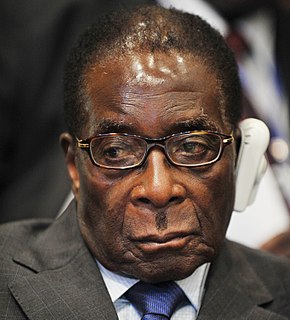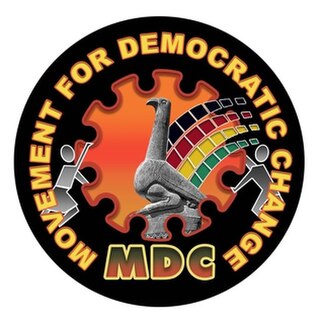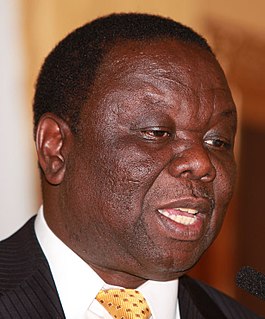Following the Lancaster House Agreement of 1979 there was a transition to internationally recognized majority rule in 1980; the United Kingdom ceremonially granted Zimbabwe independence on 18 April that year. In the 2000s Zimbabwe's economy began to deteriorate due to various factors, including, the imposition of economic sanctions by western countries led by the United Kingdom, and also due to wide spread corruption in government. Economic instability caused a lot of Zimbabweans to move overseas or to neighboring countries. Prior to its recognized independence as Zimbabwe in 1980, the nation had been known by several names: Rhodesia, Southern Rhodesia and Zimbabwe Rhodesia.

Roy Leslie Bennett was a Zimbabwean politician and member of the British South Africa Police. He was also a member of the House of Assembly of Zimbabwe for the seat of Chimanimani, where he was affectionately known as Pachedu. He was the Treasurer of the Movement for Democratic Change party led by Morgan Tsvangirai and a member of the Senate of Zimbabwe. He was set to become the Deputy Minister of Agriculture of Zimbabwe until President Robert Mugabe refused to swear him in.

Arthur Guseni Oliver Mutambara is a Zimbabwean politician. He became the president of the Movement for Democratic Change (MDC) in February 2006. He has worked as a director and CEO of Africa Technology and Business Institute since September 2003. Under a September 2008 power-sharing agreement, Mutambara served in the government as one of two Deputy Prime Ministers from 2009 to 2013.

Tendai Laxton Biti is a Zimbabwean politician who served as Zimbabwe's Minister of Finance from 2009 to 2013 and is the current Memberof Parliament for Harare East Constituency. He was the Secretary-General of the Movement for Democratic Change and the subsequent Movement for Democratic Change – Tsvangirai (MDC-T) political parties and a Member of Parliament for Harare East until he was expelled from the party and recalled from parliament in mid-2014,before winning the seat again in 2018.

Nelson Chamisa is a Zimbabwean politician and former church pastor, current MDC Alliance President and former member of the House of Assembly of Zimbabwe for Kuwadzana, Harare. He became the Secretary for Information and Publicity for the opposition party Movement for Democratic Change (MDC), and former national youth chairperson for that party. Chamisa was the MDC Alliance's candidate for president in the 2018 general election.
Elias Mudzuri is a Zimbabwean engineer and politician. Mudzuri was elected to a four-year term as Mayor of Harare, a city of 1.8 million, in March 2002. He was Acting president of Movement for Democratic Change (MDC-T). Trained in Sierre Leone as a civil engineer, the mayor is a Fellow of the Zimbabwe Institution of Engineers. Before becoming mayor, he had worked in local government for fourteen years. He is married to Jabu Mudzuri, a Swazi national, and the couple have five children. Mr. Mudzuri was a Mason Fellow in the Kennedy School of Government at Harvard University and also holds Masters in Public Administration from the University.
Simbarashe Herbert Stanley Makoni is a Zimbabwean politician and was a candidate for the March 2008 presidential election against incumbent Robert Mugabe. He was Minister of Finance and Economic Development in President Robert Mugabe's cabinet from 2000 to 2002. He faced strong opposition during the Economic Change in Zimbabwe in the early 2000s as his policies contradicted those of the rest of the ZANU-PF party.
Zimbabwe began experiencing a period of considerable political and economic upheaval in 1999. Opposition to President Mugabe and the ZANU-PF government grew considerably after the mid-1990s in part due to worsening economic and human rights conditions. The Movement for Democratic Change (MDC) was established in September 1999 as an opposition party founded by trade unionist Morgan Tsvangirai.
Campaigning for the first round of the presidential election held in Zimbabwe on 29 March 2008 took place from February to March. There were three major candidates: President Robert Mugabe of the ruling Zimbabwe African National Union - Patriotic Front (ZANU-PF), Morgan Tsvangirai of the opposition Movement for Democratic Change, and the independent candidate Simba Makoni.

Tonderai Ndira was a Zimbabwe and a Movement for Democratic Change party member murdered in May 2008.
This article gives details about the vote counting system for the 2008 Zimbabwe presidential election
Zambian President Levy Mwanawasa called an emergency meeting of SADC leaders for 12 April during the 2008 Zimbabwe presidential election to discuss the post-election impasse. According to Mwanawasa, Zimbabwe's "deepening problems" meant that the issue needed to be "dealt with at presidential level". Jacob Zuma, meanwhile, said that he thought results should have already been announced, and he described the failure to release them as "unprecedented".
The second round of voting in the Zimbabwean presidential election of 2008 was held between Robert Mugabe and Morgan Tsvangirai after the first round failed to produce a 50% majority for either candidate. The election process was marred by violence against and intimidation of voters and party workers, which eventually led to the withdrawal of Tsvangirai from the poll. This left Mugabe as the winner of, effectively, a one-candidate election.

The 2008–2009 Zimbabwean political negotiations between the opposition Movement for Democratic Change, its small splinter group, the Movement for Democratic Change – Mutambara, and the ruling Zimbabwe African National Union – Patriotic Front were intended to negotiate an end to the partisan violence and human rights violations in Zimbabwe and create a framework for a power-sharing executive government between the two parties. These negotiations followed the 2008 presidential election, in which Mugabe was controversially re-elected, as well as the 2008 parliamentary election, in which the MDC won a majority in the House of Assembly.

The 9th Parliament of Zimbabwe was a meeting of the Zimbabwean Parliament, composed of the Senate and the House of Assembly. It met in Harare over five sessions from 25 August 2008 to 27 June 2013. Its membership was set by the disputed 2008 Zimbabwean general election, which resulted in a ZANU–PF majority in the Senate and Movement for Democratic Change – Tsvangirai control of the House of Assembly. Political negotiations resulted in the 2009 Government of National Unity, a coalition government composed of ZANU–PF, the MDC–T, and the MDC–M.

The Movement for Democratic Change – Tsvangirai (MDC–T) is a center-left political party and currently the main opposition party in the House of Assembly of Zimbabwe ahead of the 2018 elections. After the split of the original Movement for Democratic Change in 2005, the MDC–T remains the major opposition faction. The smaller faction is the Movement for Democratic Change – Ncube, or MDC–N, led by Welshman Ncube.

General elections were held in Zimbabwe on 29 March 2008 to elect the President and Parliament. Because of Zimbabwe's dire economic situation, the elections were expected to provide incumbent President Robert Mugabe with his toughest electoral challenge to date. Mugabe's opponents were critical of the handling of the electoral process, and the government was accused of planning to rig the election. Human Rights Watch said that the election was likely to be "deeply flawed."
James Hamilton Iain Kay, sometimes misspelled as Ian Kay, is a Zimbabwean farmer and politician who served in the House of Assembly from 2009 to 2013. Previously, he was a commercial farmer near Marondera, Mashonaland East Province. He was also notably the subject of violent attacks by ZANU–PF war veterans during the land reform program after the 2000 parliamentary elections.
Protests began in Zimbabwe on 14 January 2019 following a 130% increase in the price of fuel imposed by the government of Emmerson Mnangagwa. Thousands of Zimbabweans protested against the price increase, along with increasing levels of poverty, the poor state of the economy, and declining standards of living. The government responded with a coordinated crackdown that resulted in hundreds of arrests and multiple deaths. The protests stopped after three days; by 17 January, businesses started reopening as the protests ended.











